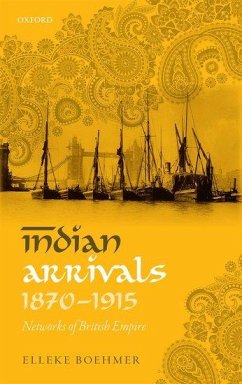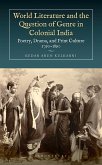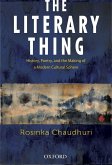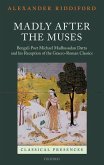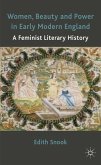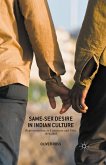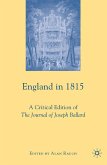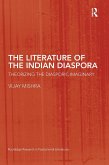- Gebundenes Buch
- Merkliste
- Auf die Merkliste
- Bewerten Bewerten
- Teilen
- Produkt teilen
- Produkterinnerung
- Produkterinnerung
Indian Arrivals 1870-1915 examines how Indian influences and ideas were threaded through British society at the height of the empire, in spite of colonial divisions.
Andere Kunden interessierten sich auch für
![World Literature and the Question of Genre in Colonial India World Literature and the Question of Genre in Colonial India]() Kedar Arun KulkarniWorld Literature and the Question of Genre in Colonial India132,99 €
Kedar Arun KulkarniWorld Literature and the Question of Genre in Colonial India132,99 €![The Literary Thing The Literary Thing]() Rosinka ChaudhuriThe Literary Thing52,99 €
Rosinka ChaudhuriThe Literary Thing52,99 €![Madly After the Muses Madly After the Muses]() Alexander RiddifordMadly After the Muses195,99 €
Alexander RiddifordMadly After the Muses195,99 €![Women, Beauty and Power in Early Modern England Women, Beauty and Power in Early Modern England]() Edith SnookWomen, Beauty and Power in Early Modern England61,99 €
Edith SnookWomen, Beauty and Power in Early Modern England61,99 €![Same-Sex Desire in Indian Culture Same-Sex Desire in Indian Culture]() Oliver RossSame-Sex Desire in Indian Culture38,99 €
Oliver RossSame-Sex Desire in Indian Culture38,99 €![England in 1815 England in 1815]() England in 181561,99 €
England in 181561,99 €![The Literature of the Indian Diaspora The Literature of the Indian Diaspora]() Vijay MishraThe Literature of the Indian Diaspora197,99 €
Vijay MishraThe Literature of the Indian Diaspora197,99 €-
-
-
Indian Arrivals 1870-1915 examines how Indian influences and ideas were threaded through British society at the height of the empire, in spite of colonial divisions.
Hinweis: Dieser Artikel kann nur an eine deutsche Lieferadresse ausgeliefert werden.
Hinweis: Dieser Artikel kann nur an eine deutsche Lieferadresse ausgeliefert werden.
Produktdetails
- Produktdetails
- Verlag: Oxford University Press
- Seitenzahl: 302
- Erscheinungstermin: 15. Dezember 2015
- Englisch
- Abmessung: 223mm x 144mm x 30mm
- Gewicht: 506g
- ISBN-13: 9780198744184
- ISBN-10: 0198744188
- Artikelnr.: 42647421
- Herstellerkennzeichnung
- Libri GmbH
- Europaallee 1
- 36244 Bad Hersfeld
- gpsr@libri.de
- Verlag: Oxford University Press
- Seitenzahl: 302
- Erscheinungstermin: 15. Dezember 2015
- Englisch
- Abmessung: 223mm x 144mm x 30mm
- Gewicht: 506g
- ISBN-13: 9780198744184
- ISBN-10: 0198744188
- Artikelnr.: 42647421
- Herstellerkennzeichnung
- Libri GmbH
- Europaallee 1
- 36244 Bad Hersfeld
- gpsr@libri.de
Elleke Boehmer is Professor of World Literature in English at the University of Oxford, and Professorial Governing Body Fellow at Wolfson College. She has published Colonial and Postcolonial Literature (1995, 2005), Empire, the National and the Postcolonial, 1890-1920 (2002), Stories of Women (2005), and the biography Nelson Mandela (2008). She is the author of four acclaimed novels, as well as the short-story collection Sharmilla and Other Portraits (2010). She edited Robert Baden-Powell's Scouting for Boys (2004), and the anthology Empire Writing (1998), and co-edited J.M. Coetzee in Writing and Theory (2009), Terror and the Postcolonial (2009), The Indian Postcolonial (2010), and The Postcolonial Low Countries (2012). She is the General Editor of the Oxford Studies in Postcolonial Literatures Series.
* Introduction: Indian Arrival-Encounters between Indians and Britons,
1870-1915
* I Encounter
* II Interconnected Cultural Terrains
* III Cross-border Poetics
* IV Arrivals and Arrivants
* V The Enigma of Arrival
* VI Chapters
* 1: Passages to England: Suez, the Indian pathway
* I Ondaatje's 'fragmentary tableaux'
* II Across the Black Waters
* III The 'magnificent ditch' in its imperial context
* IV British perspectives
* V Indian passages to England: travelling in the west
* VI Forged through the medium of travel: Toru Dutt and Sarojini Naidu
* 2: The Spasm of the Familiar: Indians in late nineteenth-century
London
* I '... to England to discover India'
* II Native and foreign in England
* III 'Versions of our old route': India-in-Britain
* IV City networks: 'No route back'
* V A poetics of crossing: 'that world-wide circle ... like an electric
current'
* 3: Lotus Artists: Self-orientalism and Decadence
* I 'Catching the nearing echo': 1890s poetic encounters between India
and Britain
* II The fantastical 1890s
* III 'Lotus-eyed' Ghose 'the Primavera poet'
* IV 'so impetuous and so sympathetic': Sarojini Naidu as
self-orientalist
* V Cornelia Sorabji: 'getting England into my bones'
* 4: Edwardian Extremes and Extremists, 1901-13
* I Difference within
* II India Housed and Unhoused
* III Indian Bloomsbury
* IV On or about 1912
* 5: Coda-Indian Salients
* 6: Works Cited
1870-1915
* I Encounter
* II Interconnected Cultural Terrains
* III Cross-border Poetics
* IV Arrivals and Arrivants
* V The Enigma of Arrival
* VI Chapters
* 1: Passages to England: Suez, the Indian pathway
* I Ondaatje's 'fragmentary tableaux'
* II Across the Black Waters
* III The 'magnificent ditch' in its imperial context
* IV British perspectives
* V Indian passages to England: travelling in the west
* VI Forged through the medium of travel: Toru Dutt and Sarojini Naidu
* 2: The Spasm of the Familiar: Indians in late nineteenth-century
London
* I '... to England to discover India'
* II Native and foreign in England
* III 'Versions of our old route': India-in-Britain
* IV City networks: 'No route back'
* V A poetics of crossing: 'that world-wide circle ... like an electric
current'
* 3: Lotus Artists: Self-orientalism and Decadence
* I 'Catching the nearing echo': 1890s poetic encounters between India
and Britain
* II The fantastical 1890s
* III 'Lotus-eyed' Ghose 'the Primavera poet'
* IV 'so impetuous and so sympathetic': Sarojini Naidu as
self-orientalist
* V Cornelia Sorabji: 'getting England into my bones'
* 4: Edwardian Extremes and Extremists, 1901-13
* I Difference within
* II India Housed and Unhoused
* III Indian Bloomsbury
* IV On or about 1912
* 5: Coda-Indian Salients
* 6: Works Cited
* Introduction: Indian Arrival-Encounters between Indians and Britons,
1870-1915
* I Encounter
* II Interconnected Cultural Terrains
* III Cross-border Poetics
* IV Arrivals and Arrivants
* V The Enigma of Arrival
* VI Chapters
* 1: Passages to England: Suez, the Indian pathway
* I Ondaatje's 'fragmentary tableaux'
* II Across the Black Waters
* III The 'magnificent ditch' in its imperial context
* IV British perspectives
* V Indian passages to England: travelling in the west
* VI Forged through the medium of travel: Toru Dutt and Sarojini Naidu
* 2: The Spasm of the Familiar: Indians in late nineteenth-century
London
* I '... to England to discover India'
* II Native and foreign in England
* III 'Versions of our old route': India-in-Britain
* IV City networks: 'No route back'
* V A poetics of crossing: 'that world-wide circle ... like an electric
current'
* 3: Lotus Artists: Self-orientalism and Decadence
* I 'Catching the nearing echo': 1890s poetic encounters between India
and Britain
* II The fantastical 1890s
* III 'Lotus-eyed' Ghose 'the Primavera poet'
* IV 'so impetuous and so sympathetic': Sarojini Naidu as
self-orientalist
* V Cornelia Sorabji: 'getting England into my bones'
* 4: Edwardian Extremes and Extremists, 1901-13
* I Difference within
* II India Housed and Unhoused
* III Indian Bloomsbury
* IV On or about 1912
* 5: Coda-Indian Salients
* 6: Works Cited
1870-1915
* I Encounter
* II Interconnected Cultural Terrains
* III Cross-border Poetics
* IV Arrivals and Arrivants
* V The Enigma of Arrival
* VI Chapters
* 1: Passages to England: Suez, the Indian pathway
* I Ondaatje's 'fragmentary tableaux'
* II Across the Black Waters
* III The 'magnificent ditch' in its imperial context
* IV British perspectives
* V Indian passages to England: travelling in the west
* VI Forged through the medium of travel: Toru Dutt and Sarojini Naidu
* 2: The Spasm of the Familiar: Indians in late nineteenth-century
London
* I '... to England to discover India'
* II Native and foreign in England
* III 'Versions of our old route': India-in-Britain
* IV City networks: 'No route back'
* V A poetics of crossing: 'that world-wide circle ... like an electric
current'
* 3: Lotus Artists: Self-orientalism and Decadence
* I 'Catching the nearing echo': 1890s poetic encounters between India
and Britain
* II The fantastical 1890s
* III 'Lotus-eyed' Ghose 'the Primavera poet'
* IV 'so impetuous and so sympathetic': Sarojini Naidu as
self-orientalist
* V Cornelia Sorabji: 'getting England into my bones'
* 4: Edwardian Extremes and Extremists, 1901-13
* I Difference within
* II India Housed and Unhoused
* III Indian Bloomsbury
* IV On or about 1912
* 5: Coda-Indian Salients
* 6: Works Cited

